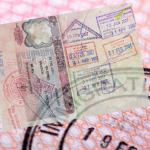This website uses cookies so that we can provide you with the best user experience possible. Cookie information is stored in your browser and performs functions such as recognising you when you return to our website and helping our team to understand which sections of the website you find most interesting and useful.
Karla

Nomade
What should I know before
going to Germany?
Are there any difficulties in travelling to Germany?
The question may seem strange to some, but believe me, I hear it very often. People worry about communication, Nazis, prejudices, how much it will cost, how many days to stay, what is the best time to travel, if travelling in winter it will freeze, or where is possible to see snow? If anyone can drive on the roads without speed limits, and so on.
So I want to clarify everything about Germany for you to be able to travel carefree.
Of course, there is no difficulty in travelling to Germany because it is one of the richest, most open and touristy countries in the world. Still, you can never know too much about the country before you come here.
Everything you always wanted to know about Germany
but were afraid to ask

Entering Germany
Valid passport;
Visa;
employment contract, scholarship or bank statement that proves you have money in your account;
proof of income to stay in the country
health insurance;
proof of address.
Check here the countries that need a visa to enter Europe.
General Information

Berlin.
Germany has more neighboring countries than any other country. It borders nine countries: Austria, Belgium, Denmark, France, Luxembourg, the Netherlands, Poland, the Czech Republic, and Switzerland.
Central European Time (CET). From the end of March to the end of October, the clocks are put forward one hour (daylight saving time).
In Germany the standard voltage is 230 V and the frequency is 50 Hz.
The official currency is the Euro.
You can withdraw money at 24-hour ATMs with your EC card or international credit cards. All major credit cards are accepted in Germany. Taxes are always included in the prices.
Energy in Germany is sourced predominantly by fossil fuels, followed by wind, nuclear power, solar, biomass (wood and biofuels) and hydro.
Solar energy in Germany in 2020 represents 12.4% of the total energy matrix in the country, enough to supply all households twice on the national territory. When considering industrial energy consumption, we have 52.2% of the energy generated coming from renewable sources (in 2019 it was 46%).
In 2002, Germany adopted a sustainability strategy for the first time and has revised it repeatedly. Today, the focus is on a wide variety of topics: from the National Hydrogen Strategy or the general promotion of research and development to strengthening organic farming and the worldwide commitment to adequate food. The German government is planning to publish a new strategy in 2021 and has also obtained suggestions from citizens, for example via online forums. The statements gathered on the German government’s website range from, for example, the fundamental demand for more adult education about sustainability to tips on climate neutrality in specialized literature.

Transporte na Alemanha
Public transportation in most German cities works very well. Only in the very small towns are they not so accessible. And it is true that you never have a person selling tickets. You have to do everything yourself on a machine. But don’t worry about being embarrassed, because what you see most are tourists “catching” the machines. And in the end, if you really can’t buy, someone who is impatient in line behind you will help you.
There are however some alternatives for transportation in cities like Berlin, where you can buy tickets at stations or sales kiosks.
The most modern road network, with 13,000 kilometers of highways, more than 700 service stations, gas stations, hotels, and kiosks, open 24 hours. Types of fuel: super (octane rating 95), super e10 (octane rating 95), super plus (octane rating 98) and diesel. There is no speed limit on the highways, except on stretches with restrictive signs. The recommended speed is 130 km/h. Maximum speeds allowed: inside the urban perimeter: 50 km/h and outside the urban perimeter: 100 km/h. There is no toll charge. It is mandatory to use seat belts and special seats for children up to 1.50 m tall. In the event of breakdowns: User Assistance Service available by phone. The major automobile clubs (ADAC, AvD) provide information for tourists.
If you are passing through Germany, i.e. if you do not live in the country, you can drive cars in Germany in the class that your driver’s license permits, either Brazilian or international and within the validity period. However, the permit is not valid if you are not yet 18 years old. The driver’s license must be with the driver at all times. It is recommended to carry an international driver’s license, as it cannot be guaranteed that all rental companies will recognize your national driver’s license without a translation.
Sim. E os ônibus interestaduais são uma opção mais econômica de viagem. Atualmente existem mais de 250 linhas interestaduais e intermunicipais. A oferta é maior entre cidades. Todas as metrópoles alemãs são servidas por linhas de ônibus de longa distância e mesmo algumas cidades com menos de 10 mil habitantes têm um ponto de ônibus de longa distância. A concorrência é entre 8 companhias maiores. Aqui voce encontra informações sobre os percursos possíveis.
Sim. Totalmente possível e recomendável. A Alemanha tem ciclovias seguras e maravilhosas por todo o país. As pessoas de todas as idades costumam viajar bastante de bicicletas. Existem várias agências especializadas no turismo de bicicleta.
The railway network is more than 33,000 km long. Both short-distance and long-distance networks are interconnected and offer good connections. Every day, more than 250 direct connections are offered from Germany to 120 European cities.
More information here.
Tourism

Germany is a very safe place for women traveling alone. You will not face any difficulties or dangers, day or night. You will be able to walk around undisturbed, sightsee, shop, go to restaurants and nightclubs. Of course, if you are in a city like Berlin and get drunk at the crack of dawn in a club, I would not recommend, for example, crossing a deserted park by yourself. Other than that, come quietly and enjoy!
That depends on what kind of tourist you are. If you love the heat, want to see lots of people in the streets, lie on the grass in the parks, sit on the sidewalks in the cafes to watch the movement, the best time is summer.
If you want to enjoy an extra cold that is not available in your city, come in winter.
For those who like milder temperatures and the joyful atmosphere of the people because winter is over, spring is perfect. You can see the wonderful colors of the flowers and see the branches of the trees that were bare, fill with leaves again.
And to see the wonderful colors of autumn, I mean breathtaking landscapes, come between October and November.
If you do not have a guide or someone to accompany you, it is good to have at least some travel English. With it in most regions you will be able to communicate without problems. Have a good guidebook in your hands to make your life easier and to understand more about history and museums. Also to be able to place an order in a restaurant.
Yes it is possible. Camping is one of the most popular activities among Germans. There are more than 2000 campsites with excellent infrastructure in Germany. Motorhomes are very popular in the country.
The camping options are immense. There are even luxury resort facilities, sports and leisure facilities, offers for golfers, for horseback riding, for urban tourists and nature fans.
More information here.
In Germany you pay most things in cash. Most stalls, stores, shops, bars and restaurants have no card machine and credit cards are not as widely accepted as in other countries.
Germany is one of the most cash-intensive advanced economies in the world. Get acquainted with the ATMs so you have enough euros in your wallet before setting out to explore the country.
Germans like to play by the rules, and when you’re on their turf, so should you. For starters, always wait for the traffic light to go green before crossing the road. People will disapprove and shake their heads at jaywalking, so practice a little discipline and respect the code of conduct. Secondly, if you’re planning to ride a bicycle (and you should) you always need to have a back and front light for safety reasons. Being caught in the dark or running red lights both result in hefty fines.
In the summer, in parks, on lakes and beaches, yes. So if you are visiting any of these places and see a naked German, ignore it. Pretend that this is the most natural thing in the world for you too.

Compras na Alemanha
Shopping centers are not very popular in Germany. Galleries are more typical here. There you can find the best outlets for sports brands, luxury brands, fashion for the whole family, household goods, gifts, shoes, lingerie, delicatessen, etc.
Street stores are always the most fun and individual option. Several German cities have a street or shopping area. Some are even for pedestrians only.
Yes, it is true. If you plan to spend a weekend in Germany, don’t count on Sunday for shopping in the formal trade. So there are antique fairs, if you are more into second hand items. I love them!!!



